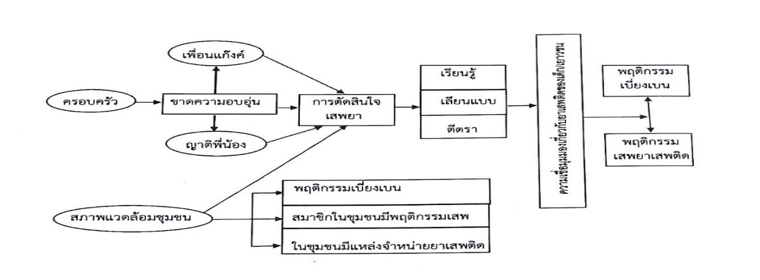ปัจจัยที่ส่งผลต่อการตัดสินใจเสพยาเสพติดของเด็กและเยาวชนที่เข้ารับการบำบัดในสถานบริการจังหวัดภูเก็ต
คำสำคัญ:
เด็กและเยาวชน, การเสพยาเสพติด, ตัดสินใจเสพยาเสพติดบทคัดย่อ
การวิจัยครั้งนี้ มีวัตถุประสงค์เพื่อศึกษา 1) ปัจจัยที่ส่งผลต่อการตัดสินใจเสพยาเสพติดของเด็กและเยาวชน 2) กระบวนการเรียนรู้ การเลียนแบบ และการถูกตีตราจากสังคมที่พาไปสู่พฤติกรรมเบี่ยงเบนและการเสพยาเสพติดของเด็กและเยาวชน โดยกลุ่มตัวอย่างเป็นเด็กและเยาวชนที่เข้ารับบริการอยู่ในโปรแกรมบำบัด ยาเสพติดของสถานบริการในจังหวัดภูเก็ต จำนวน 72 คน เก็บรวบรวมข้อมูลโดยการสัมภาษณ์โดยใช้แบบสัมภาษณ์กึ่งมีโครงสร้าง และการสัมภาษณ์เชิงลึกโดยแบบสัมภาษณ์แบบไร้โครงสร้าง ผู้ให้ข้อมูล 20 ราย ที่คัดเลือกจากการสัมภาษณ์ตามแบบสัมภาษณ์แบบกึ่งโครงสร้างที่น่าสนใจ เครื่องมือที่ใช้ คือ แบบสัมภาษณ์แบบกึ่งโครงสร้าง และแนวคำถามสัมภาษณ์เชิงลึก ข้อมูลเชิงคุณภาพโดยวิเคราะห์เชิงเนื้อหา และข้อมูลเชิงปริมาณใช้ร้อยละ
ผลการวิจัยพบว่า 1) ปัจจัยที่ส่งผลต่อการเสพยาเสพติดของเยาวชน ประกอบด้วย 2 ส่วน คือ 1. ปัจจัยบุคคลและสภาพแวดล้อม ได้แก่ ครอบครัว เพื่อน และญาติ ซึ่งมีพฤติกรรมเกี่ยวข้องกับยาเสพติดที่เด็กและเยาวชนอาศัยอยู่ด้วย อีกทั้งสภาพแวดล้อมในชุมชนที่เด็กและเยาวชนอาศัยอยู่มีแหล่งยาเสพติดและมีสมาชิกในชุมชนเสพและจำหน่ายยาเสพติด และตัวเด็กและเยาวชน มีพฤติกรรมเรียนไม่จบ สมาชิกในครอบครัวมีปัญหา มีความเชื่อเชิงบวกต่อการเสพยาเสพติด และมีพฤติกรรมเบี่ยงเบนก่อนการตัดสินใจเสพยาเสพติด 2. เด็กและเยาวชนสามารถเสพยาเสพติดได้เพราะเรียนรู้จากบุคคลใกล้ชิดที่มีพฤติกรรมเกี่ยวข้องกับยาเสพติด และมีพฤติกรรมเสี่ยง ได้แก่ การสูบบุหรี่ และดื่มสุรา ทำให้เด็กและเยาวชนมีพฤติกรรมเลียนแบบตามบุคคลนั้น เด็กและเยาวชนที่ตัดสินใจเสพยาเสพติด เพราะการถูกตีตรามาจากการถูกกล่าวหาจากบุคคลรอบข้างว่าเด็กและเยาวชนมีพฤติกรรมการเสพยาเสพติด ทำให้เด็กและเยาวชนตัดสินใจทำตามข้อกล่าวหานั้น
ฉะนั้น เครือข่ายชมรม To be number one จังหวัดภูเก็ต ควรมีบทบาทส่งเสริมให้เยาวชนมีทักษะในการป้องกันการติดสารเสพติดตั้งแต่ระดับประถมศึกษา โดยให้ตระหนักถึงโทษของยาเสพติด และมีพฤติกรรมต่อต้าน
ความเสี่ยงที่มาจากยาเสพติด
เอกสารอ้างอิง
Aeamsupasit, S. (1996). Theories and techniques of behavior modification. Bangkok: Chulalongkorn University Press. (in Thai)
Buaphan, R. (2014). Deciding on drug abuse of children and youth: a case study of child training and raining centers and youth district 1, Rayong province. A dissertation submitted in partial fulfillment of the requirement for the master of arts, graduate school, Chulalongkorn University. (in Thai)
Burapasathit, N. (2003). Factors affecting student's drug addiction, study only the case of Mapkha School. Administration thesis, master of public administration degree program public policy branch, graduate school, Burapha University. (in Thai)
Children, Youth and Drug Groups Social Research Institute. (2013). Study report trafficking situation and dissemination of drug information epidemic among children and youths quarantined in the center train and train children and youth. Bangkok: Chulalongkorn University. (in Thai)
Culture Strategy and Surveillance Group. (2011). A model for preventing and solving drug problems by means of participatory action research. Office of the Permanent Secretary, Ministry of Culture. (in Thai)
Internal Security Operations Comand. (2014). News of internal security operations command. Retrieved March 3, 2022 from https://www.isoc.go.th. (in Thai)
Janthong, J. (2018). Young people's attitudes towards drug use in today's society: a case study: Pattaya Technical College vocational certificate students Vocational Certificate. Adissertation submitted in partial fulfillment of the requirement for the justice and social administration, Bura University. (in Thai)
Jatuhong, S. (2016). Causal factors of relapse of drug addiction in compulsive treatment Persons: A case study of Roi Et provincial probation office. A dissertation submitted in partial fulfillment of the requirement for the master of public administration, Mahasarakham University. (in Thai)
Labthananon, P. (2013). Report on the study of social and environmental conditions that affect The epidemic of drug abuse among children and youth. A dissertation submitted in partial fulfillment of the requirement for the social research institute, Chulalongkorn University. (in Thai)
Lewin, K. (1951). Field theory and leaning Ind. Cartwright field theory in social science: Selected Theoretical. New York: Harper and Row.
Office of Narectics Control Board. (2011). Drug surveillance situation report. Bangkok: Office of the Narcotics Control Board. (in Thai)
Office of the Permanent Secretary, Ministry of Education. (2011). A study of the drug epidemic situation in educational institutions. Bangkok: Thailand Agricultural Cooperative Assembly Printing Press. (in Thai)
Punnahitanon, S. (1980). Delinquency in society: the sociology of crime and deviant behavior. Bangkok: Chulalongkorn University Press. (in Thai)
Rujiraphong, J. (2007). Conditions and factors influencing drug addiction behavior among youth in Wang Chin district, Phrae province. A dissertation submitted in partial fulfillment of the requirement for the master public health, Uttaradit Rajabhat University. (in Thai)
Sriphat, N. (2005). Drug addiction decision-making process of young women in juvenile detention and protection centers in the upper northern region. A dissertation submitted in partial fulfillment of the requirement for the master of public health, Chiang Mai University. (in Thai)
Srisombat, P. (2008). The problem of drug use among youth: A case study in Nikhom Phatthana district, Rayong province. Administration thesis department of local administration master of public health, Khon Kaen University. (in Thai)
Suthilerdaroon, S. (1984). Social psychology. Bangkok: Aksornpanich. (in Thai)

ดาวน์โหลด
เผยแพร่แล้ว
รูปแบบการอ้างอิง
ฉบับ
ประเภทบทความ
สัญญาอนุญาต
ลิขสิทธิ์ (c) 2022 วิทยาลัยพยาบาลบรมราชชนนี นครศรีธรรมราช

อนุญาตภายใต้เงื่อนไข Creative Commons Attribution-NonCommercial-NoDerivatives 4.0 International License.
บทความที่ได้รับการตีพิมพ์เป็นลิขสิทธิ์ของ วิทยาลัยพยาบาลบรมราชชนนี นครศรีธรรมราช
ข้อความที่ปรากฏในบทความแต่ละเรื่องในวารสารวิชาการเล่มนี้เป็นความคิดเห็นส่วนตัวของผู้เขียนแต่ละท่านไม่เกี่ยวข้องกับวิทยาลัยพยาบาลบรมราชชนนี นครศรีธรรมราช และบุคคลากรท่านอื่น ๆ ในวิทยาลัยฯ แต่อย่างใด ความรับผิดชอบองค์ประกอบทั้งหมดของบทความแต่ละเรื่องเป็นของผู้เขียนแต่ละท่าน หากมีความผิดพลาดใดๆ ผู้เขียนแต่ละท่านจะรับผิดชอบบทความของตนเองแต่ผู้เดียว





